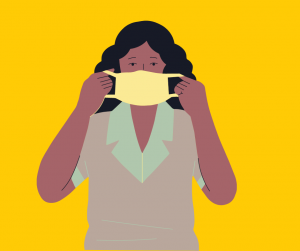
A new report released by a peak body for people with disabilities in the ACT is calling for Australian Governments to change tack and improve its response for people with disability. The white paper highlights the plight of vulnerable and immune compromised people who have now been in a state of personal lockdown for over a year even as governments remove protections. The experiences of people with disabilities stuck in isolation are expected to dominate an online forum from 1pm tomorrow where Canberra journalist Genevieve Jacobs AM (Group Editor, Region Media) will facilitate a 90 minute roundtable with ACT Health Minister Rachel Stephen-Smith MLA followed by a panel with ACT and national thought leaders advocating at the intersection of disability, health and COVID policy. The panel includes people with lived experience of shielding from COVID for over a year.
AFI Head of Policy Craig Wallace said that people with disabilities were calling for “renewed actions by governments to ensure people with disability are safe, supported and included socially and economically as the pandemic continues into its third year. Sadly COVID isn’t over for people with disability and isn’t likely to be any time soon.
“We need to centre people with disability in the pandemic with actions to ensure access to supports, treatments, COVID safe health care and an inclusion guarantee which recognises, validates and responds to the needs of people continuing to shield, Mr Wallace concluded.
Quotes attributable to panel members of the panel:
Sam Connor, President of People with Disability Australia:
“National Cabinet should acknowledge that the COVID-19 pandemic continues to threaten the lives, health, social interactions and enjoyment of social, civil and political rights of people with disability.
“There should be a program of work to address this involving disability ministers and health ministers and a key principle highlighted in the AFI paper must be that those most vulnerable in the pandemic are at the centre of the response to it.
“All the way through the pandemic we have seen decisions which are highly consequential for people with disability being made without us. Just this week National Cabinet decided to shorten the isolation period from 7 to 5 days, reduce isolation payments and remove mask requirements on planes without consulting with us – once again we will have people in our community needing to isolate and avoid places available to other people”
Corinne Dobson, A/g Chief Executive Officer, Mental Health Community Coalition ACT
“The COVID-19 pandemic has left people with disability worse off and more excluded, including people with complex and severe mental health conditions. We have seen increased rates of psychological distress in people with all forms of disability, as increased isolation has reduced their ability to connect with community—an essential component of mental wellbeing. There has also been a deepening of mental health inequalities across the population, with those with more severe mental health challenges bearing the greatest burden.
“Policies that shift the burden for managing COVID onto individuals fail to take into account the structural inequities, discrimination and exclusion that disproportionately affect people with disability, including people with psychosocial disability. It is imperative governments systemically prioritise the needs, rights and voices of people with disability and those most affected by COVID. There is also an urgent need for policies that minimise and manage the tidal wave of impairment, disability and poor mental health arising from long-COVID. Governments have long shown a lack of interest and investment in supporting people with debilitating post-viral illnesses, which can render people unable to work or participate in society. Long-COVID is a mental health ticking bomb, and our already over-burdened mental health service system is not equipped to meet the increased demand for support.
“I welcome this paper, which sparks important conversations about the need to centre people with disability in policy responses to COVID, and the actions needed to support the mental health and wellbeing of people in difficult circumstances.”
Dr George Taleporos, Consumer Advocate, Department of Health COVID-19 Disability Advisory Committee
“COVID-19 and its management is a disability rights issue, consequential to Articles 11 and 25 of the UN Convention on the Rights of People with Disability, yet since 2020 there have been troubling gaps and delays in the formation of responses, the delivery of assistance and the availability of vaccines.
“In 2022 many people with disabilities find themselves with a series of bad choices – forced to shield or risk interactions in a community which has largely dropped protections at the same time.
“I welcome this papers focus on practical responses, like ensuring home based and in-reach supports are available to people with disability and older people to keep us out of hospitals which are bad places for us”
Anna Davidson, Director of the Port Stephens GP Super Clinic and OzSAGE member
“COVID isn’t over however much we want it to be and a prudent public health approach would pay close attention to the requirements of the most vulnerable groups of people including older people and people with disabilities.
“People with disability in the UK were three times more likely to die from COVID-19, with greater disparities at younger ages. Mortality is higher still (three to five times) among adults with intellectual disability. Studies from the United States, Canada and Korea have also highlighted that people with disability are more at risk of severe disease and poor outcomes.
“Emerging findings from the Doherty Institute indicate that Australian health systems need to prepare to care for thousands of patients with Long COVID. The AFI paper rightly highlights that disability supports and income support will need to be in the mix as part of the response” #LeaveNoOneBehind Join tomorrow online via teams from 1pm and via twitter #AFICOVID. Read the White Paper on COVID here: http://www.advocacyforinclusion.org/white-paper-on-covid-19-and-people-with-disability/
Contact: Craig Wallace, Head of Policy AFI on 0477 200 755
